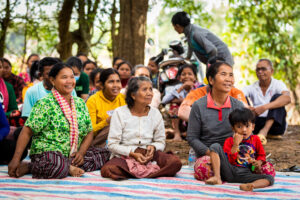In the rural village of Sala Visai, located in Cambodia’s Kampong Thom province, the delicate balance between people and nature has been nurtured for generations. The community, made up of smallholder farmers, indigenous groups such as the Kouy people and forest-dependent families, has long depended on the land’s resources to survive. From agriculture and fishing to forest-based livelihoods, their way of life is intricately tied to the environment. This close connection has fostered a rich tapestry of traditional ecological knowledge that guides sustainable resource management, passed down through the ages.
For the Kouy, the forest offers more than timber—it’s a source of medicinal herbs, wild fruits, mushrooms and honey. Their harvesting methods are deeply sustainable, based on rotating gathering zones and seasonal practices that allow the forest to regenerate. These practices are not only crucial for their survival but also for adapting to environmental changes.
In recent years, ecosystem-based adaptation (EbA) has provided a framework for integrating improved climate resilience strategies with traditional practices. By empowering communities to harness both their cultural knowledge and contemporary tools, EbA helps them confront the challenges of a changing climate while preserving their cultural heritage.
What is Ecosystem-Based Adaptation (EbA)?
Ecosystem-based adaptation is a holistic approach to addressing climate change that emphasizes the protection, restoration and sustainable management of ecosystems. By leveraging the natural environment to enhance resilience, EbA seeks to reduce vulnerability to climate impacts while promoting environmental conservation. In rural communities like Sala Visai, EbA does more than build resilience—it also empowers local people by fostering community-led leadership and inclusive participation.
By blending community-driven action with environmental stewardship, EbA offers a powerful pathway to sustainable resilience, rooted in local customs and traditions.
Engaging Local Voices: The Power of Community Participation
At the heart of EbA lies community engagement. Effective adaptation strategies must involve the very people who will be most affected by climate change, ensuring that solutions are both culturally relevant and practically effective. In Sala Visai, this has meant organizing participatory planning sessions, community workshops and resource management training that actively involve local residents in every phase of adaptation—from planning to implementation and evaluation.
One of the driving forces behind this community participation is the involvement of local leaders, particularly women and youth. Women have proven essential in the success of EbA initiatives, often forming committees that lead efforts to raise awareness, organize resource management activities and share knowledge with others. Youth, too, have become champions of environmental stewardship, taking on leadership roles in ecosystem protection and the promotion of climate-resilient practices.
By tailoring educational approaches to the community’s needs—such as using the local language, visual aids, and storytelling techniques—these initiatives ensure that people not only understand the strategies but also embrace them.
The Role of Women in Resource Management
In Sala Visai, women play a pivotal role in natural resource management. Not only are they the guardians of traditional knowledge, but they are also at the forefront of implementing sustainable practices. Many women in the community are the first to adopt water conservation techniques, soil preservation methods and sustainable agricultural practices within their households.
For example, traditional farming techniques like crop rotation and inter-cropping have been adapted to modern needs, helping to improve soil fertility and reduce reliance on chemical fertilizers. Through these efforts, local farmers have enhanced their resilience to climate stressors such as drought and floods.
Moreover, women-led committees have played a significant role in advocating for water-saving irrigation systems and organic farming methods, which have led to better agricultural yields, particularly during dry spells.
This community-driven approach not only enhances environmental resilience but also strengthens local governance structures. Village committees and resource management groups have been empowered, fostering a sense of collective responsibility for the environment.
Overcoming Barriers to Inclusive Participation
While the benefits of EbA are clear, there are still challenges to achieving full, inclusive participation. Cultural norms, gender roles and resistance to change can often prevent marginalized groups—particularly women and youth—from being fully involved in decision-making processes.
To overcome these barriers, projects in Sala Visai have focused on capacity-building and trust-building within the community. Training sessions that highlight the value of inclusive leadership have been crucial. Additionally, participatory workshops allow open dialogues, helping to address concerns and encouraging acceptance of EbA strategies.
By creating a space where all voices are heard and valued, these efforts are paving the way for a more inclusive and resilient future.
Outcomes and Community-Level Impacts
The impact of EbA in Sala Visai has been profound, with tangible benefits for both the environment and the community.
A success story from the village highlights the impact of women’s leadership in EbA. One local woman spearheaded a community-driven water management initiative, which significantly boosted agricultural productivity during the dry season. Her success not only empowered her but also sparked a ripple effect, encouraging others in the community to embrace these climate-resilient practices.
A Resilient Future for Sala Visai and Beyond
Ecosystem-based adaptation is more than just a strategy for climate resilience—it’s a way to empower communities, honor cultural traditions and build a more sustainable future. In Sala Visai, this approach has helped strengthen both environmental and social resilience, proving that community-driven solutions can be a powerful tool in the fight against climate change.
By embracing both modern resilience strategies and traditional knowledge, communities like Sala Visai can continue to thrive, preserving their natural environment and cultural heritage while adapting to an ever-changing world.
You can learn more about our work in Cambodia by clicking here.


